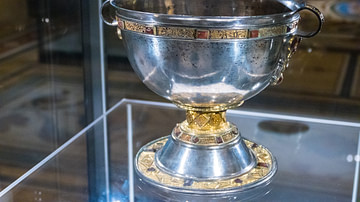Search Definitions
Browse Content (p. 116)

Definition
Parthian Art
Parthian art flourished within the Eurasian cultural corridor from the late hundreds BCE to the early 1st and 2nd centuries CE. With the Parthian Empire (247 BCE - 224 CE) stretching from India and China in the east to the Mediterranean shores...

Definition
Donato Bramante
Donato Bramante (c. 1444-1514 CE) was an Italian Renaissance architect whose most famous project was the design for a new Saint Peter's Basilica in Rome, even if this work remained unfinished at his death. Bramante had also designed the influential...

Definition
Edward Winslow
Edward Winslow (l. 1595-1655 CE) was a member of the separatist congregation (later known as pilgrims) which sailed aboard the Mayflower in 1620 CE to establish the Plymouth Colony in modern-day Massachusetts, USA. He became one of the more...

Definition
Myles Standish
Myles Standish (l. c. 1584-1656 CE) was the military advisor to the Plymouth Colony who traveled with the colonists (later known as pilgrims) aboard the Mayflower in 1620 CE. The colonists were made up of members of a religious separatist...

Definition
Ancient Greek Dance
In ancient Greece, dance had a significant presence in everyday life. The Greeks not only danced on many different occasions, but they also recognized several non-performative activities such as ball-playing or rhythmic physical exercise...

Definition
Renaissance Art
The art of the Renaissance period in Europe (1400-1600 CE) includes some of the most recognisable and best-loved paintings and sculptures in the world. Masters were often skilled in both painting and sculpture, and by studying the art of...

Definition
Robert Cushman
Robert Cushman (l. 1577-1625 CE) was an author, lay preacher, and member of the Leiden congregation of separatists (later known as the pilgrims) who negotiated passage for them from the Netherlands to North America in 1620 CE aboard the Mayflower...

Definition
Derrynaflan Hoard
The Derrynaflan Hoard is a collection of Irish altar vessels dating between the 8th and 9th centuries CE. Discovered on the island of Derrynaflan, in the townland of Lurgoe, Co. Tipperary in 1980 CE, the pieces are now on display at the National...

Definition
Hans Holbein the Younger
Hans Holbein the Younger (c. 1497-1543 CE) was a German Renaissance painter who is most famous for his portraits. A versatile artist and superb draughtsman, Holbein was accomplished in different mediums from woodcut engravings to murals...

Definition
Renaissance Humanism
Renaissance Humanism was an intellectual movement typified by a revived interest in the classical world and studies which focussed not on religion but on what it is to be human. Its origins went back to 14th-century Italy and such authors...